When it comes to keeping your little one safe, choosing a reliable air purifier is key. The LEVOIT Core 300-P offers a compact design and high efficiency, removing 99.97% of allergens. If you need coverage for larger spaces, the MorenTo Smart Air Purifier is perfect with its smart features and quiet operation. The BLUEAIR Blue Pure 511 combines low noise with effective filtration, while the lightweight Small Air Purifier is great for desktops. Finally, the LEVOIT Core 200S-P guarantees powerful performance in larger rooms. Explore these options to find the best fit for your home and your baby's health.
LEVOIT Air Purifier for Home (Core300-P)
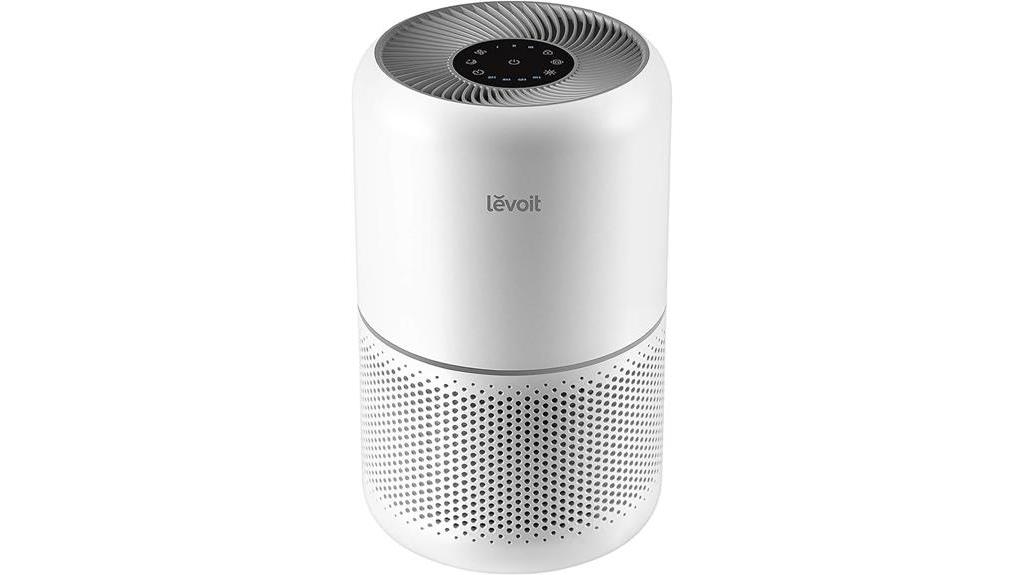
When it comes to creating a safe and healthy environment for your infant, the LEVOIT Core 300-P Air Purifier stands out as an excellent choice. Its compact design, measuring just 8.7 x 8.7 x 14.2 inches, fits seamlessly into any room, while effectively covering up to 1,095 square feet. With its high-torque motor and impressive CADR of 141 CFM, it purifies the air once an hour, ensuring your baby's space stays fresh. I love that it filters out 99.97% of allergens like dust and pet dander, making it perfect for sensitive little ones. Plus, the quiet operation at just 24dB means it won't disturb your child's sleep. With user-friendly features and effective filtration, it's a solid investment for your infant's health.
Best For: Families with infants or individuals sensitive to allergens seeking a compact and quiet air purification solution.
Pros:
- Effective filtration removes 99.97% of allergens like dust, pollen, and pet dander.
- Quiet operation at just 24dB, making it suitable for bedrooms and nurseries.
- Compact design allows for easy placement in various home environments.
Cons:
- Filter replacement is needed every 6 months, which can add to maintenance costs.
- Coverage may be limited in larger open spaces, requiring multiple units for optimal air purification.
- Touch controls may not be as intuitive for all users compared to traditional knobs or buttons.
MorenTo Smart Air Purifier for Large Rooms
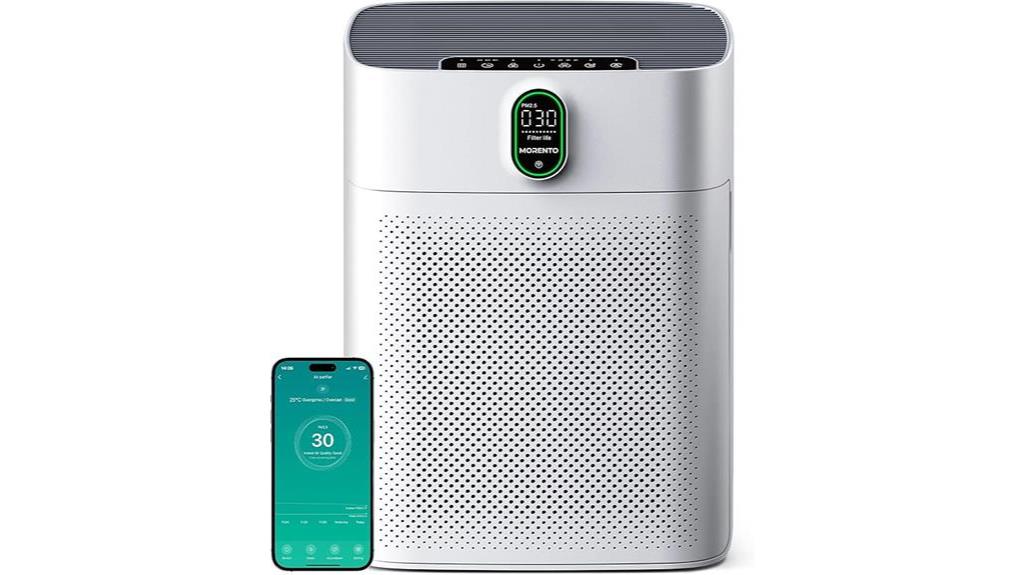
The MorenTo Smart Air Purifier for Large Rooms is an excellent choice for parents seeking to create a healthy environment for their infants. This model effectively covers large spaces up to 1076 ft², making it perfect for nurseries or living areas. With a CADR of up to 300 m³/h, it removes 99.97% of airborne particles, including dust and smoke, thanks to its multi-layer HEPA filters. I love the smart features, like using the "Havaworks" app for real-time monitoring and scheduling. Plus, it's compatible with Amazon Alexa and Google Assistant for hands-free control. The quiet sleep mode operates under 24dB, ensuring my little one sleeps soundly while breathing clean air. It's a reliable investment for your child's health.
Best For: Parents looking to create a healthy and clean air environment for their infants in large spaces.
Pros:
- Effective Coverage: Suitable for large rooms up to 1076 ft², ideal for nurseries and living areas.
- Smart Features: Includes app control and voice compatibility for convenient operation.
- Quiet Operation: Sleep mode operates below 24dB, ensuring minimal disturbance during sleep.
Cons:
- Filter Replacement: Requires filter changes approximately every 6 months, which can add to maintenance costs.
- Initial Setup: Some users may find the app setup process slightly complicated.
- Size: Its compact design may still be considered bulky for smaller spaces.
BLUEAIR Air Purifier for Bedroom (Blue Pure 511)
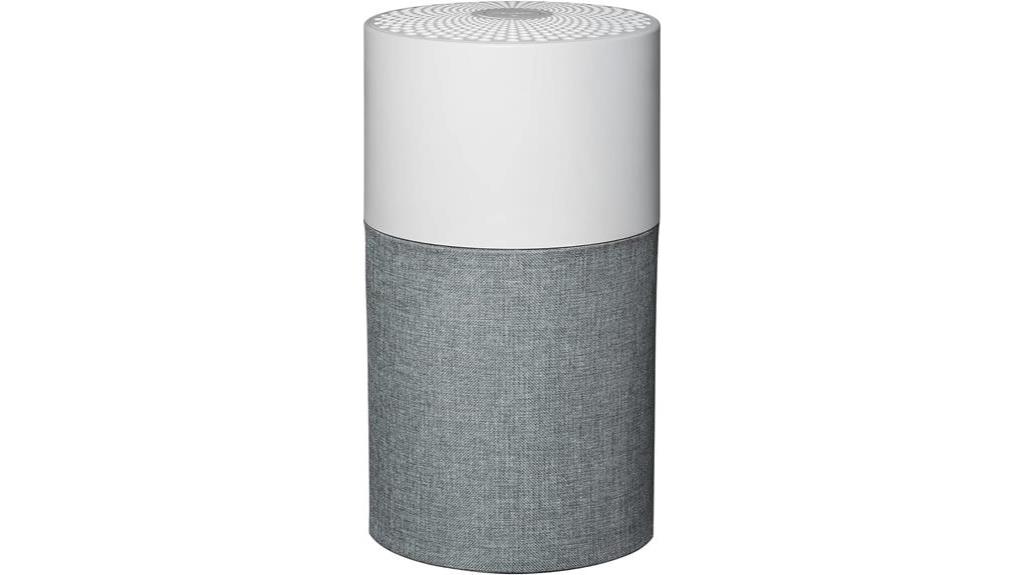
If you're looking for an air purifier that's perfect for your baby's nursery, the Blueair Blue Pure 511 stands out with its low noise level of just 24 dB on the lowest setting. This compact unit effectively cleans spaces up to 432 square feet in just 30 minutes, ensuring fresh air for your little one. With HEPASilent technology, it captures 99.97% of airborne particles, including dust and allergens. I appreciate its stylish design that fits seamlessly into any decor and its Energy Star certification, which means it's energy-efficient. The washable pre-filter comes in various colors, letting you personalize it. While some users find the controls a bit tricky, the overall performance and low power consumption make it an excellent choice for any nursery.
Best For: Families seeking a quiet and efficient air purifier for bedrooms or nurseries due to its low noise level and effective filtration.
Pros:
- Energy-efficient with Energy Star certification, consuming less energy than a 40-watt LED bulb.
- HEPASilent technology captures 99.97% of airborne particles, ensuring clean air by filtering out dust, allergens, and smoke.
- Stylish and compact design allows it to blend seamlessly into any home decor, making it visually appealing.
Cons:
- Some users find the button controls less intuitive, which can make operation challenging.
- There are concerns about the difficulty in adjusting settings, particularly for those who prefer more straightforward controls.
- Regular filter replacement may be necessary, and some users recommend keeping extra filters on hand for optimal performance.
Small Air Purifier for Home and Office
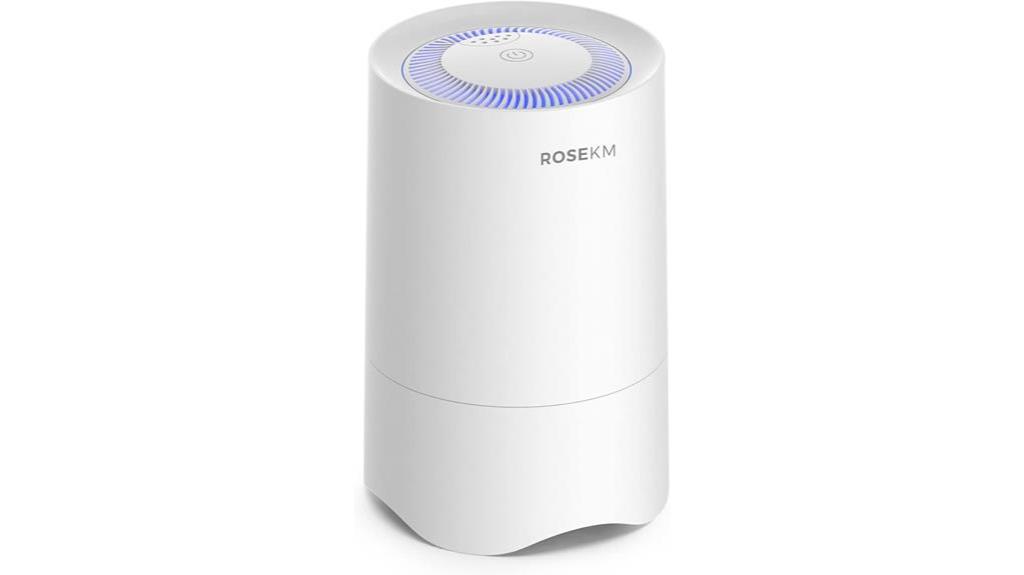
Looking for a compact air purifier that fits seamlessly into your home or office? I found a great option that weighs just 1.1 pounds and can easily fit on your desktop or in the kitchen. This small air purifier features an H13 true HEPA filter that captures 99.97% of particles, like pet dander and dust, ensuring a healthier environment. Plus, it operates at a whisper-quiet 28dB, perfect for undisturbed sleep or focused work. While some users have had mixed experiences with the diffuser function, many report a significant improvement in air quality, especially in reducing cigarette smoke and allergens. With a one-year warranty and lifetime support, it's a solid choice for maintaining fresh air in tight spaces.
Best For: Those seeking a compact air purifier that enhances air quality in small spaces like bedrooms and offices.
Pros:
- H13 true HEPA filter captures 99.97% of particles, improving air quality significantly.
- Whisper-quiet operation at 28dB allows for undisturbed sleep and work.
- Compact and lightweight design makes it easy to fit in various small spaces.
Cons:
- Some users report malfunctions shortly after purchase, receiving faulty units.
- Mixed reviews on the effectiveness of the diffuser function, with some finding it underwhelming.
- Customer satisfaction varies, with reports of disappointment regarding product quality and air quality improvement.
LEVOIT Air Purifier for Home (Core 200S-P)
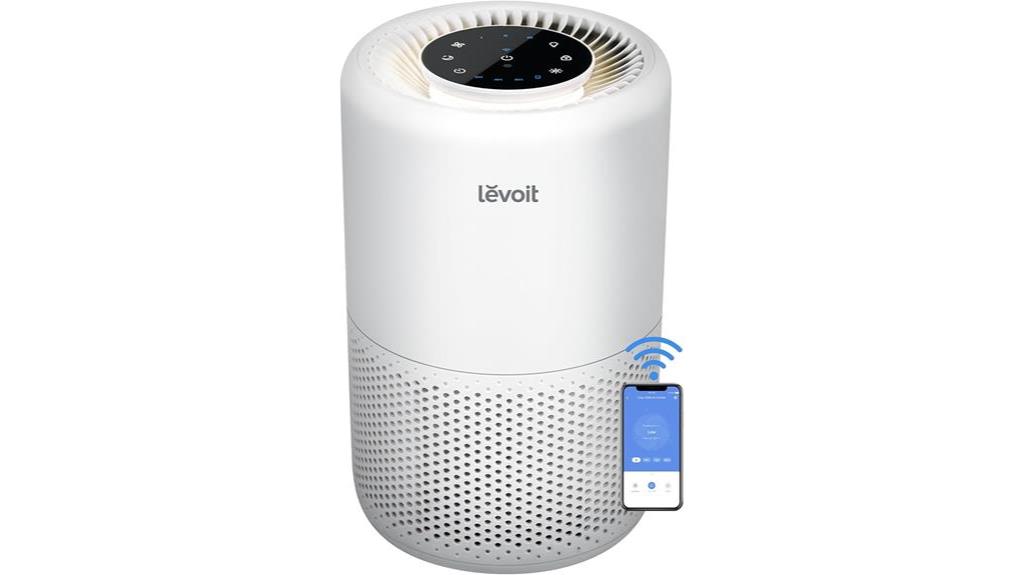
For parents seeking a safe and healthy environment for their little ones, the LEVOIT Core 200S-P Air Purifier is an excellent choice with its impressive ability to remove at least 99.97% of airborne particles as small as 0.3 microns. It covers up to 916 sq. ft., making it perfect for larger rooms. Weighing just 6.58 pounds, it's easy to move around. Plus, with a noise level of only 24 dB, it operates quietly, ensuring your baby sleeps soundly. I love that I can control it via the VeSync app or through Alexa and Google Assistant. Users rave about its effectiveness in improving air quality and reducing allergies, making it a reliable addition to any nursery.
Best For: Parents looking for a reliable air purifier to create a safe and healthy environment for their children.
Pros:
- Quiet operation at only 24 dB, making it ideal for nurseries and bedrooms.
- Effective in removing 99.97% of airborne particles, improving air quality significantly.
- Smart features allow for easy control and scheduling via the VeSync app or voice assistants like Alexa and Google Assistant.
Cons:
- Occasional disconnections noted with the app, which can be frustrating.
- Some users desire a dedicated remote control for convenient night-time adjustments.
- Filter replacements must be genuine Levoit products, which may add to maintenance costs.
Factors to Consider When Choosing Air Purifiers for Infants
When choosing an air purifier for your infant, you'll want to take into account several key factors. Noise level is essential, as you don't want a loud purifier disturbing your baby's sleep. Additionally, check the filter efficiency ratings and reflect on the size, portability, and any smart features that might make maintenance easier.
Noise Level Considerations
Creating a peaceful sleep environment for your infant is crucial, and noise level plays a notable role in that. When choosing an air purifier, aim for models that operate below 30 dB to guarantee a quiet atmosphere. Many effective purifiers run at around 24 dB during sleep mode, making them ideal for nighttime use in nurseries.
Be mindful that high fan speeds can substantially increase noise levels, so look for units with adjustable fan settings. This feature allows you to reduce noise when your baby is sleeping. Remember, infants are particularly sensitive to sound, and loud appliances can disrupt their sleep patterns.
You may also want to take into account air purifiers that come equipped with a night mode. This mode not only minimizes noise but often turns off indicator lights, creating an undisturbed environment for your little one. Prioritizing a quiet operation guarantees your infant can sleep soundly, allowing both of you to enjoy a restful night. By focusing on noise levels, you can create a serene space that promotes better sleep and overall well-being for your baby.
Filter Efficiency Ratings
Choosing the right air purifier for your infant hinges considerably on filter efficiency ratings, which indicate how well the device captures airborne particles. Look for a purifier with a rating of 99.97% or higher, as this is ideal for removing allergens and harmful pollutants. HEPA (High-Efficiency Particulate Air) filters are your best bet since they can trap particles as small as 0.3 microns, including dust, pollen, and pet dander—issues particularly concerning for your little one's sensitive respiratory system.
Ensure the air purifier you select has been tested by independent laboratories, so you know its filter efficiency ratings are reliable and meet industry standards for air quality. Another important metric is the Clean Air Delivery Rate (CADR), which measures the volume of filtered air the purifier delivers. A higher CADR indicates better performance in removing specific pollutants like smoke, dust, and pollen.
Don't forget that regular maintenance and filter replacement are essential. Clogged filters can considerably reduce the purifier's ability to clean the air, so staying on top of upkeep is critical for keeping your infant's environment fresh and safe.
Size and Portability
Filter efficiency ratings are important, but the size and portability of an air purifier also play a significant role in your decision-making process. When choosing an air purifier for your infant, consider models that weigh between 5 to 8 pounds. These compact options make it easy for you to move the unit between rooms or fit it into small spaces.
You'll want to select a purifier with a coverage area of at least 400 to 1,000 square feet to effectively clean the air in a nursery or small bedroom, ensuring a safer environment for your little one. Portability is key; look for designs that blend seamlessly with your decor yet are easy to relocate whenever needed.
Additionally, consider the dimensions of the air purifier. Ideally, it should fit comfortably on a nightstand or small table, with a height that keeps it out of reach of curious hands. A lightweight design not only simplifies setup but also makes it effortless to clean the unit or change its location without straining your back. Keeping all these factors in mind will help you create a fresher atmosphere for your infant.
Smart Features Availability
When selecting an air purifier for your infant, consider the benefits of smart features that enhance convenience and safety. Smart air purifiers often come with app control, allowing you to monitor and adjust air quality settings remotely. This means you can guarantee a safe environment for your little one, even from another room.
Many models also include voice control compatibility with Amazon Alexa or Google Assistant, offering hands-free operation for busy caregivers. Imagine being able to make adjustments simply by speaking, letting you focus on your baby while still managing air quality.
Real-time air quality monitoring sensors provide instant feedback on conditions, alerting you to any changes that may require immediate attention. This feature can be essential for maintaining a healthy environment. Some smart air purifiers even automate adjustments based on detected air quality levels, optimizing filtration without you needing to lift a finger.
Additionally, features like scheduled operation help maintain consistent air quality during specific times, such as naptime or bedtime, promoting a healthier sleeping environment for your infant. Embracing these smart capabilities can give you peace of mind and guarantee your baby's air is always fresh and safe.
Maintenance and Longevity
Maintaining your air purifier is essential for guaranteeing a safe and healthy environment for your infant. Regular filter replacement is vital, with many models recommending changes every six months to keep performance at its best. To help you stay on top of this, modern air purifiers often come with smart features that monitor filter life, alerting you when it's time for a change.
When choosing an air purifier, look for models with durable construction and easy-to-replace filters. This not only enhances longevity but also reduces the frequency of purchases. Additionally, you should remember that proper maintenance goes beyond just filter replacement. Cleaning pre-filters and external surfaces can greatly extend the device's lifespan and improve air quality.
Lastly, consider the cost of replacement filters as part of your long-term investment. Prices can vary widely across different brands and models, so factor this into your decision-making process. By focusing on maintenance and longevity, you'll guarantee your air purifier continues to provide fresh, safe air for your little one, making it an invaluable addition to your home.
Frequently Asked Questions
How Often Should I Replace the Air Purifier Filters?
You should replace your air purifier filters every 3 to 6 months, depending on your usage and the type of filter. If you live in a dusty area or have pets, you might need to change them more frequently. Always check the manufacturer's recommendations for specific guidance. Keeping an eye on the filter indicator lights can also help you know when it's time for a change, ensuring your air stays clean and fresh.
Are Air Purifiers Safe to Use Overnight for Infants?
Yes, air purifiers are generally safe to use overnight for infants. They help reduce allergens and pollutants, promoting cleaner air for your little one. Just make sure to choose a model with a low noise level, so it doesn't disturb their sleep. Also, check that it doesn't emit ozone, which can be harmful. Regularly maintain the purifier by replacing filters as needed to keep the air fresh and safe.
Can Air Purifiers Help With Allergies in Infants?
Imagine a serene garden, where allergies don't exist. Air purifiers can create a similar environment for your infant by filtering out dust, pollen, and pet dander. They help reduce potential allergens in the air, making it easier for your little one to breathe. While they won't eliminate all allergy triggers, using an air purifier can considerably improve air quality. So, you can enjoy those peaceful nights, knowing your baby's comfort is enhanced.
Do Air Purifiers Emit Ozone, and Is It Safe?
Air purifiers can emit ozone, especially those using ionization or ozone generation technologies. While some models are designed to minimize ozone production, it's essential to check the specifications. Ozone can be harmful, particularly to sensitive individuals, so you'll want to avoid purifiers that release significant amounts of it. Always look for purifiers that comply with safety standards and have been certified for low ozone emissions to guarantee a healthier environment.
What Is the Ideal Room Size for an Infant Air Purifier?
When choosing an air purifier for an infant's room, consider the size of the space. Ideally, you want a unit that's rated for the square footage of the room. Most purifiers specify their coverage area, so check this detail to confirm peak performance. A purifier covering 200-400 square feet should work well for a nursery. This way, you'll keep the air clean and safe for your little one while maximizing the purifier's effectiveness.
Wrapping Up
In the quest for pure air, choosing the right air purifier is like finding a guardian angel for your little one's breathing space. With options like the LEVOIT Core 300-P and the MorenTo Smart Air Purifier, you're not just investing in a device; you're embracing peace of mind. As you create a haven of fresh, safe air, remember: every breath your baby takes is a step toward a healthier future. Breathe easy knowing you've made the best choice!

Hi, I’m Charlie, and I cover all things laundry here at Appliance Mastery.
I’ve spent over eight years working on washing machines, dryers, and dishwashers. I also have a degree in mechanical engineering, which helps me understand how these appliances really work.
I try to make every guide clear and practical. If you’re stuck with a noisy dryer or a leaking washer, I’ll help you figure out what’s wrong and how to fix it.
